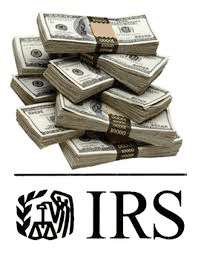Tax Payment Organizational Ideas You Can Bank On
by Ranger Kidwell-Ross
 For many power sweeping contractors the most difficult part of the business is not performing the necessary work. Rather, it is dealing with the regulatory and accounting aspects of running the company. Keeping track of tax liability can be especially difficult for the small contractor who does not have an in-house financial manager. For many power sweeping contractors the most difficult part of the business is not performing the necessary work. Rather, it is dealing with the regulatory and accounting aspects of running the company. Keeping track of tax liability can be especially difficult for the small contractor who does not have an in-house financial manager.
As with many other parts of running a business, early and effective preparation is the key to not being caught by surprise or finding that you have been penalized by the IRS. Here are some ideas to make setting aside money for your tax liability and payments as painless as possible.
Know what your tax liability is before your taxes are due
As a business owner there is no doubt that you will eventually have to pay your taxes. If you pay them late or incorrectly, you will certainly pay more than if you paint the correct amount and do so on time. One of the keys to not getting in trouble in this regard is to fully understand your tax liability prior to when your payments are due.
Quarterly taxes, including sales tax and payroll taxes, should never be a surprise. For reference, here are links to the current rates for payroll tax and for sales tax. Be sure you are aware of these liabilities and have included them in your bid structure so they are covered as a part of your normal business billing activities.
If you are unaware of the current rates for any of the taxes you are liable for, this information may be found at this website.
Keep your business and personal funds separate
Especially if you are a sole proprietorship it may be tempting to dip into your tax account for personal items, promising that you will replace the money as soon as that next big check comes in. I promise you this is a path you do not want to go down.
No matter how small your business may be, be sure to separate your business and personal accounts. Pay yourself out of your business account, whether this is wages or reimbursement for deductible business expenses.
Resist the temptation to pull money earmarked for taxes out of your business account for any reason. In our next section I will discuss an easy way to keep from doing so.
Create special bank accounts earmarked for tax payments
Many small businesses have only one business account and pay all of their bills, including their taxes, from it. Although this is better by far than operating your business out of a personal account, it is still not optimal and can lead to trouble at tax time.
Tax professionals suggest that a good way to ensure you have the money needed for taxes is to set up a special bank account for that purpose. After the first step, above, you do know what your tax liability is on an ongoing basis now, right? So, the next step is to make regular tax payments into your bank account that you use only for collecting taxes prior to when they are due. Best is to do this on monthly basis and only take money out each quarter to meet your quarterly tax liability.
Since you know in advance exactly what your tax liability is, as long as you have placed that amount into your account each month then it will be there when you need it. You will not be caught off guard when it comes time to make your tax payment, because the exact amount you need will be there waiting. As long as you have not dipped into your tax accountant for some other purpose than the amount in the account will equal your current liability.
While we are talking about special accounts, you should also consider creating yet another bank account where you put money earmarked for a rainy day or for financing the growth of your business. When it is in a separate account you will find it is much easier to ignore than when you try to simply keep an "extra balance" in your primary business account.
When you lump all of your money into one account, by contrast, is much easier to use the money to pay for something else that you may not actually be able to afford.
Consider hiring a bookkeeper or an accountant
It has never been easier for small business owner to keep company books in-house, given software programs like QuickBooks. However, if you find it confusing or that the negatives outweigh the positives, you should consider hiring an accountant or bookkeeping service to handle that task for you.
In many cases, you will find that the cost of their services far outweigh the time and hassle you may be facing when trying to do these tasks yourself.
For more information on small business taxes, visit the IRS' Small Business and Self-Employed One-Stop Resource.
|